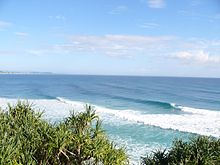Snapper Rocks


Snapper Rocks is a small rocky outcrop on the northern side of Point Danger at the southern end of Rainbow Bay on the Gold Coast, Queensland, Australia.[1] It is a famous surf break and today the start of the large sand bank known to surfers as the Superbank.[2]
History
[edit]

It is believed that Snapper Rocks were named by W.L. Edwardson, captain of HM Colonial Cutter Snapper which passed by Point Danger in July 1822.[1]
Surfing
[edit]Snapper Rocks is a point break, which as of 2007, forms the first part of the man-made "Superbank" surf break.[3]
Since 1995 the Tweed River sand bypass system has pumped sand from the Tweed River mouth to beaches to the north to ensure the river mouth is safe for shipping, and to stabilise coastal erosion north of the river. This has resulted in a large build-up of sand between Snapper Rocks to Kirra, which as of 2007, has extended the beaches in this area seawards around 100-200m, and created a new, world-class sandbar surf break called "the Superbank".[3]
The Superbank extends from Snapper Rocks Point, through Rainbow Bay, Greenmount Point, Coolangatta Beach, and Kirra, for a distance of around 2 kilometres (1.2 mi). Multiple barrel sections can now occur at any point along this length. The quality of the surf in the first 4 of these sections has markedly improved since the 1990s, creating one of the longest, hollowest and best waves in the world. However, the quality of the last section, Kirra, which has long been regarded as one of the world's best waves prior to the formation of the Superbank, has suffered. There have been calls to modify aspects of the sand bypass system to attempt to restore Kirra to its former quality, although exactly how this is to be done is not clear. It is possible that an optimum, medium build-up of sand (such as was reportedly the state in the early 2000s) may create the longest and best waves over the entire length, including Kirra.[3]
The sheer quality of the man-made wave has greatly increased the level of surf tourism in the region, which has also resulted in extreme crowding of the wave. On a good day, over 500 surfers can be counted over the 2 kilometres (1.2 mi) distance, with multiple drop-ins.[4]
Pool
[edit]
In 1956 Jack Evans built the Snapper Rocks Sea Baths, with an adjacent shark pool for public viewing. Later that year the Boyd brothers, local fishermen, caught two bottlenose dolphins in the Terranora Creek which Evans took and put in the pool for the Jack Evans Porpoise Pool show.[5][6] The pools moved to the mouth of the Tweed River near to Duranbah beach in 1961.[7][8][6] Only remnants of the pools remain today.[9][10]
See also
[edit]References
[edit]- ^ a b "Snapper Rocks (entry 31326)". Queensland Place Names. Queensland Government. Retrieved 14 January 2014.
- ^ "Snapper Rocks". Tourism & Events Queensland. Queensland Government. Archived from the original on 24 February 2024. Retrieved 13 August 2024.
- ^ a b c "The Secrets of Snapper Rocks: The Gold Coasts' Superbank". World Surf League. 14 March 2017. Retrieved 13 August 2024.
- ^ "The Best Surfing Spots of Coolangatta". The Strand, Coollangatta. 26 April 2018. Archived from the original on 11 March 2019. Retrieved 16 May 2019.
- ^ "TEENAGERS' PARADISE". The Australian Women's Weekly. Vol. 27, no. 37. Australia. 17 February 1960. p. 9 (Teenagers' Weekly). Retrieved 20 September 2020 – via National Library of Australia.
'One of the chief attractions on the border is Jack Evans porpoise pool at Schnapper Rocks, beneath Point Danger.'
- ^ a b "Girl with a dolphin". The Australian Women's Weekly. Vol. 32, no. 48. Australia. 28 April 1965. p. 14. Archived from the original on 22 November 2020. Retrieved 20 September 2020 – via National Library of Australia.
'The idea of the show came to Mr. Evans about ten years ago when he put two dolphins in a small aquarium at his swimming baths at Snapper Rocks, Tweed Heads.'
- ^ Tweed River entrance with a view to Duranbah Beach and Jack Evans second Porpoise Pool, New South Wales, January 1969 [picture]/Photographer unknown (JPG) (Image). City of Gold Coast Libraries Local Studies Collection. 1969. LS-LSP-CD013-IMG0065. Retrieved 20 September 2020.
- ^ "Memories of diving into Pet Porpoise Pool". 13 September 2019. Archived from the original on 28 May 2020. Retrieved 20 September 2020.
'Jack Evans built ocean pools at Burleigh Heads (1953) and Snapper Rocks (1957) and, still fascinated by sharks, built a second pool for them at Snapper, before re-establishing at the mouth of the Tweed River in 1961.'
- ^ Jack Evans sea baths and shark pool at Snapper Rocks, Coolangatta, Queensland (JPG) (Image). City of Gold Coast Libraries Local Studies Collection. 1956. LS-LSP-CD009-IMG0015. Retrieved 20 September 2020.
- ^ "Local Heritage Register: Heritage Places, N to Z" (PDF). Gold Coast Local Heritage Register. 2010. p. 103. LHR0040. Archived from the original (PDF) on 26 August 2020. Retrieved 20 September 2020.
Although only remnants of the pools survive, the site has archaeological potential to yield information that will contribute to the understanding of the nature of a coastal aquarium.
- "Snapper Rocks.com". History of Snapper Rocks. Archived from the original on 15 May 2006. Retrieved 15 February 2006.
- Perfect wave reveals dark heart of surfing, The Age, 25 April 2007
